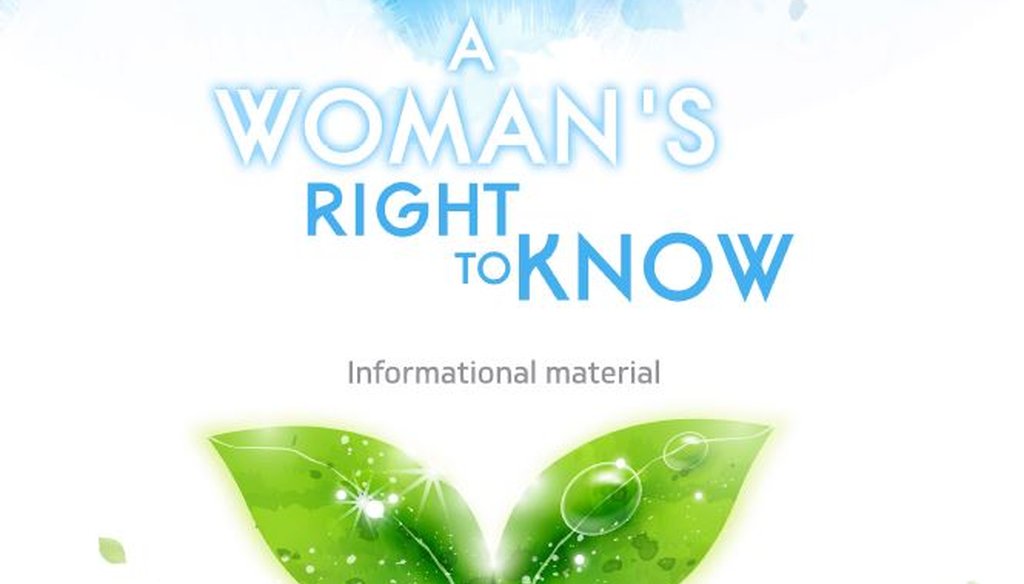Stand up for the facts!
Our only agenda is to publish the truth so you can be an informed participant in democracy.
We need your help.
I would like to contribute

Language in this State of Texas booklet about abortion and breast cancer led to three Pinocchio's from the Fact Checker at The Washington Post (Cover image, December 2016).
In 2013, PolitiFact Ohio found Pants on Fire a claim that abortion increases the risks of breast cancer; the declared link was overwhelmingly contradicted by credible research.
Now the Fact Checker at The Washington Post has found no basis to a new State of Texas statement about abortions and breast cancer, bestowing three Pinocchios for inaccuracy. Those three Pinocchios mean "significant factual error and/or obvious contradictions."
When we asked about the Post's analysis, though, a Texas official stood by the published language.
At issue is a section of the recently updated State of Texas booklet, "A Woman’s Right to Know," which by law must be given to any woman considering an abortion in the state.
The booklet says: "Your pregnancy history affects your chances of getting breast cancer. If you give birth to your baby, you are less likely to develop breast cancer in the future. Research indicates that having an abortion will not provide you this increased protection against breast cancer."
Sign up for PolitiFact texts
The section continues: "In addition, doctors and scientists are actively studying the complex biology of breast cancer to understand whether abortion may affect the risk of breast cancer. If you have a family history of breast cancer or breast disease, ask your doctor how your pregnancy will affect your risk of breast cancer."
The Post’s Dec. 14 story about this abortion-breast cancer section points out there’s no solid research linking abortions to breast cancer and while the booklet’s language doesn’t "outwardly claim" that research supports an abortion-cancer link, "the wording misleads the reader to come to a similar conclusion."
The fact check goes on to say that research backs up the booklet’s statements about a woman’s pregnancy history affecting her chances of getting breast cancer and that if a woman gives birth, she’s less likely to develop breast cancer. But, the Post found, there is no credible research suggesting that having an abortion affects a woman’s breast cancer risks, up or down.
According to the Post, the Texas Department of State Health Services "pointed us to five studies in the footnotes of the booklet. Two of the studies say there is no significant association between abortions and the risk of breast cancer.
"A third study found that women in India who have a non-vegetarian diet or had more years of education faced a greater risk of breast cancer. Educated women are more aware of detecting breast cancer, or are married later and have their first children later in life (possibly having abortions to delay childbirth), the study says.
"The final two studies reported associations between induced abortions and women with breast cancer in China," but that was based on a disputed research method, the Post reported.
Upshot, per the Post: The booklet "makes it seem as though getting an abortion is the deciding risk factor" in risking breast cancer. "Further, this is a government report that purports to give a woman all the information she needs to know about her pregnancy, yet cherry-picks information to create a misleading impression."
We asked Carrie Williams, spokeswoman for the Texas Health and Human Services Commission, whether officials concurred with the Post’s fact check. Williams replied by email: "We stand by the accuracy of the Woman's Right to Know booklet. In developing the booklet, we carefully reviewed information from the American Congress of Obstetricians and Gynecologists, Royal College of Obstetricians and Gynaecologists, and other governmental health and medical resources. Our focus is ensuring that pregnant women have medically accurate information so they can make decisions that are right for them."
Our Sources
Truth-O-Meter article, "State Rep. Ron Hood links abortion and breast cancer in legislation," PolitiFact Ohio, June 24, 2013
Fact check, "Texas state booklet misleads women on abortions and their risk of breast cancer," the Fact Checker, The Washington Post, Dec. 14, 2016
Booklet, "A Woman’s Right to Know," Texas Department of State Health Services, 2016 (downloaded Dec. 14, 2016)
Email, Carrie Williams, chief press officer, Texas Health and Human Services Commission, Dec. 14, 2016

































